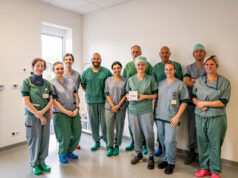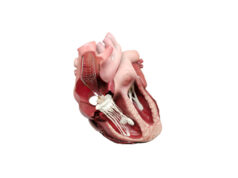A press release reports that the first patient to receive the GATE tricuspid valved stent (NaviGate) via transjugular access has reached one-year post-procedure with “excellent valvular function”. It adds that this patient, along with 15 others to date, was treated under compassionate use protocols for severe tricuspid regurgitation. The tricuspid valved stent is designed to lead to restored valvular function and improved quality of life.
This first transjugular implantation of the GATE tricuspid valved stent occurred at the Cleveland Clinic in April 2017. At one year, the valvular bioprosthesis is demonstrating excellent leaflet mobility and valve function. The patient, according to the press release, says: “I could not walk from one end of my house to the other before the valve was implanted. Now, it feels great to go everywhere.”
Samir Kapadia and José Navia, the implanting cardiac team at Cleveland Clinic, explained that the patient has no more fluid build-up (ascites and oedema), which accounts in large part for the patient’s loss of nearly 20kg (about 40 lbs.) in weight.
Columbia Presbyterian Hospital in New York has treated the largest number of patients with the GATE tricuspid bioprosthesis to date, with all patients in good condition at seven, four and two months post-procedure. The first two Columbia Presbyterian Hospital implants, now at seven months, are a 92-year-old woman and a 94-year-old man who are now enjoying good mobility and are quite active.
In addition, a total of four patients have been successfully treated with the device at the Cleveland Clinic under compassionate use basis, with no 30-day mortality.
Of these, a patient undergoing intervention in the last two months demonstrated the possibility that the GATE tricuspid bioprosthesis can be implanted in patients with pacemaker leads traversing their tricuspid valve. This patient, a 79-year-old female, was released with a well-functioning 52mm valve and seemingly improved QoL and has since returned from her distant home state for valvular function and clinical condition assessment more than a month post-intervention. Also, a 77-year-old female having undergone an intervention at Cleveland Clinic on the day prior with a 48mm GATE, was released on day five after her massive tricuspid regurgitation score 5 was corrected to a trace incompetence. Reassessment of this patient at one month provided evidence of excellent valvular function.
Since the beginning of this calendar year, a total of eight additional patients have received the GATE tricuspid valved stent in response to compassionate pleas to find a therapy to alleviate symptoms resulting from tricuspid valvular incompetence. NaviGate Cardiac Structures are currently in the process of gathering requisite information supporting initiation of clinical feasibility trials to assess the safety and effectiveness of the GATE system for dysfunctional tricuspid valve therapy. Presently, NaviGate Cardiac Structures catheter-guided GATE bioprosthesis is the only orthotopic transcatheter valve replacement under development to treat severe tricuspid regurgitation.
R Quijano, CEO of NaviGate Cardiac Structures, says: “NaviGate Cardiac Structures is working diligently to move into a feasibility clinical trial to initiate safety and effectiveness research of the tricuspid bioprosthesis. These compassionate plea patient implants are instructive and obviously are good for the patients who have no other recourse—although, we find several who cannot be helped by the valve since their ventricular function is beyond repair and their postoperative course would be troubled. Careful patient selection is imperative to obtain proof of what the GATE tricuspid valved stent bioprosthesis can or cannot do, and that requires a well-controlled clinical trial to obtain such evidence, which we hope to start later in the year. Until then, we have requests from many centres in Europe, the USA and Canada to do both: more compassionate cases and a full trial.”














Would like to know of hospitals in the Gulf Coast Region which offer the GATE bioprosthesis. My husband has been told NOTHING can be done. But reading about this procedure I am sure he is an immediate candidate. Help me find HELP for him before it is too late.